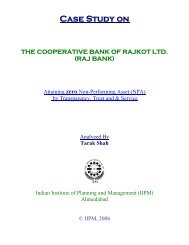[Dec 2007, Volume 4 Quarterly Issue] Pdf File size - The IIPM Think ...
[Dec 2007, Volume 4 Quarterly Issue] Pdf File size - The IIPM Think ...
[Dec 2007, Volume 4 Quarterly Issue] Pdf File size - The IIPM Think ...
You also want an ePaper? Increase the reach of your titles
YUMPU automatically turns print PDFs into web optimized ePapers that Google loves.
REIMAGINING INDIA<br />
then the resource saving should be properly<br />
accounted and used strictly for alleviating<br />
adverse side effects.<br />
Model For delegation<br />
For ease of discussion I will arrange governance<br />
services into three groups. First<br />
are the services for individuals that are<br />
provided on demand. As far as the consumer<br />
is concerned, these are like any<br />
other private good that she or he uses<br />
exclusively. Getting a passport, a driving<br />
licence, a variety of registration, certification<br />
and so on are of this category. <strong>The</strong><br />
second group consists of services that are<br />
public goods by nature. Once produced<br />
and in place, any one can dip into their<br />
benefit and it is not possible to deny anyone<br />
access. Hence governance involves<br />
producing these services for whoever is<br />
interested and not for any one in particular.<br />
Examples are roads, bridges, street<br />
lighting and road maintenance and so<br />
on. People are quite aware of the usefulness<br />
of these services, but are prone to<br />
understate how much they would be willing<br />
to pay. <strong>The</strong> reason is so called ‘free<br />
riding’ – why pay if they can’t stop me<br />
from using it? <strong>The</strong> third group is a special<br />
class of public goods type services<br />
whose benefit most may not be aware of.<br />
Or, even if they are aware, most people<br />
put a low priority on them because the<br />
benefit appears distant and dispersed. I<br />
will call them pro-active governance<br />
services because the public may not generally<br />
press for them as they do for other<br />
public goods like roads or bridges. Some<br />
of these services may be directed at individuals<br />
but most are not directed to anyone<br />
in particular. When serving individuals,<br />
they produce large scale<br />
externality benefits. An example is a program<br />
of immunisation against a contagious<br />
disease. It saves an immunised<br />
person from the disease even as it reduces<br />
the chance of others getting it.<br />
More generally these services are not<br />
directed and are produced for the benefit<br />
of everyone at present and in the future.<br />
Examples are services like foresta-<br />
Services that are public goods by nature are thought to be an<br />
area where markets would fail to produce the right amount at<br />
the right cost even if markets are competitive to the hilt<br />
tion, dredging and cleaning of rivers,<br />
reforestation of hill sides, creating buffers<br />
at arid zones and so on.<br />
<strong>The</strong> three groups of services lend<br />
themselves to marketisation in different<br />
degrees and are amenable to different<br />
business models. <strong>The</strong>ir impact on corruption<br />
and the political system vary.<br />
Some have more impact on the political<br />
system while others have more<br />
positive and attending adverse side effects<br />
upon the economy.<br />
Individually Demanded Services<br />
Provision of an individually demanded<br />
service can be most easily transferred to<br />
markets. Unlike for public goods, its demand<br />
is easy to recognise. Because demand<br />
arises from the need of an individual<br />
who benefits from it alone, it can<br />
be priced. Also generally these services<br />
are not free under our present system.<br />
<strong>The</strong>y are either sold at a price or a fee is<br />
charged. <strong>The</strong>refore they can be sold like<br />
any item of consumption by private sellers.<br />
However, unlike a consumption item,<br />
some services are conditional on not only<br />
the price but also characteristics of the<br />
applicant or buyer. Suppose a registration<br />
service can not be sold to persons<br />
below 18 years. <strong>The</strong> selling organisation<br />
has to carry out the necessary verification.<br />
In fact part of the price accounts<br />
for the cost of verification of the applicant.<br />
Like clerks in government offices<br />
who currently provide these services,<br />
sellers are to be provided with relevant<br />
rules. <strong>The</strong>se rules should be made public,<br />
displayed prominently at service<br />
shops and should be mandated to be<br />
available on demand.<br />
What are the potential objections to<br />
this possibility? First, will the price remain<br />
reasonable? Yes, if firms are allowed<br />
to enter this business freely, their<br />
competition should keep price close to<br />
the cost of production and provision. In<br />
the present system government offices<br />
producing these services are over-staffed.<br />
It is easy to see that the cost of providing<br />
them would be significantly lower for private<br />
firms. <strong>The</strong> government often subsidises<br />
the price, which means that part of<br />
the true cost and whole of the cost of inefficiency<br />
of government offices is passed<br />
to the government budget for the tax<br />
payer to bear. Tax payers would be spared<br />
this in the suggested scenario. What if<br />
38 THE <strong>IIPM</strong> THINK TANK


![[Dec 2007, Volume 4 Quarterly Issue] Pdf File size - The IIPM Think ...](https://img.yumpu.com/29766298/37/500x640/dec-2007-volume-4-quarterly-issue-pdf-file-size-the-iipm-think-.jpg)


![[Feb 2008, Volume V Annual Issue] Pdf File size - The IIPM Think Tank](https://img.yumpu.com/43961117/1/190x245/feb-2008-volume-v-annual-issue-pdf-file-size-the-iipm-think-tank.jpg?quality=85)
![[June 2008, Volume V Quarterly Issue] Pdf File size - The IIPM Think ...](https://img.yumpu.com/41693247/1/190x245/june-2008-volume-v-quarterly-issue-pdf-file-size-the-iipm-think-.jpg?quality=85)









![[Volume VI | Quarterly Issue: 31st May 2009] Pdf File size](https://img.yumpu.com/27796051/1/190x245/volume-vi-quarterly-issue-31st-may-2009-pdf-file-size.jpg?quality=85)